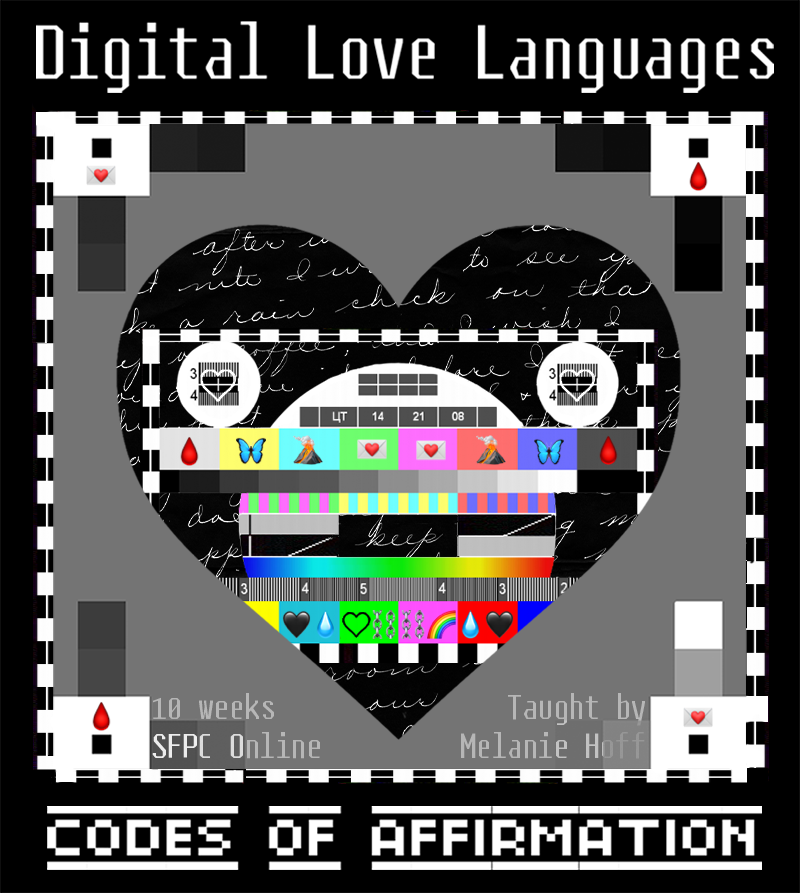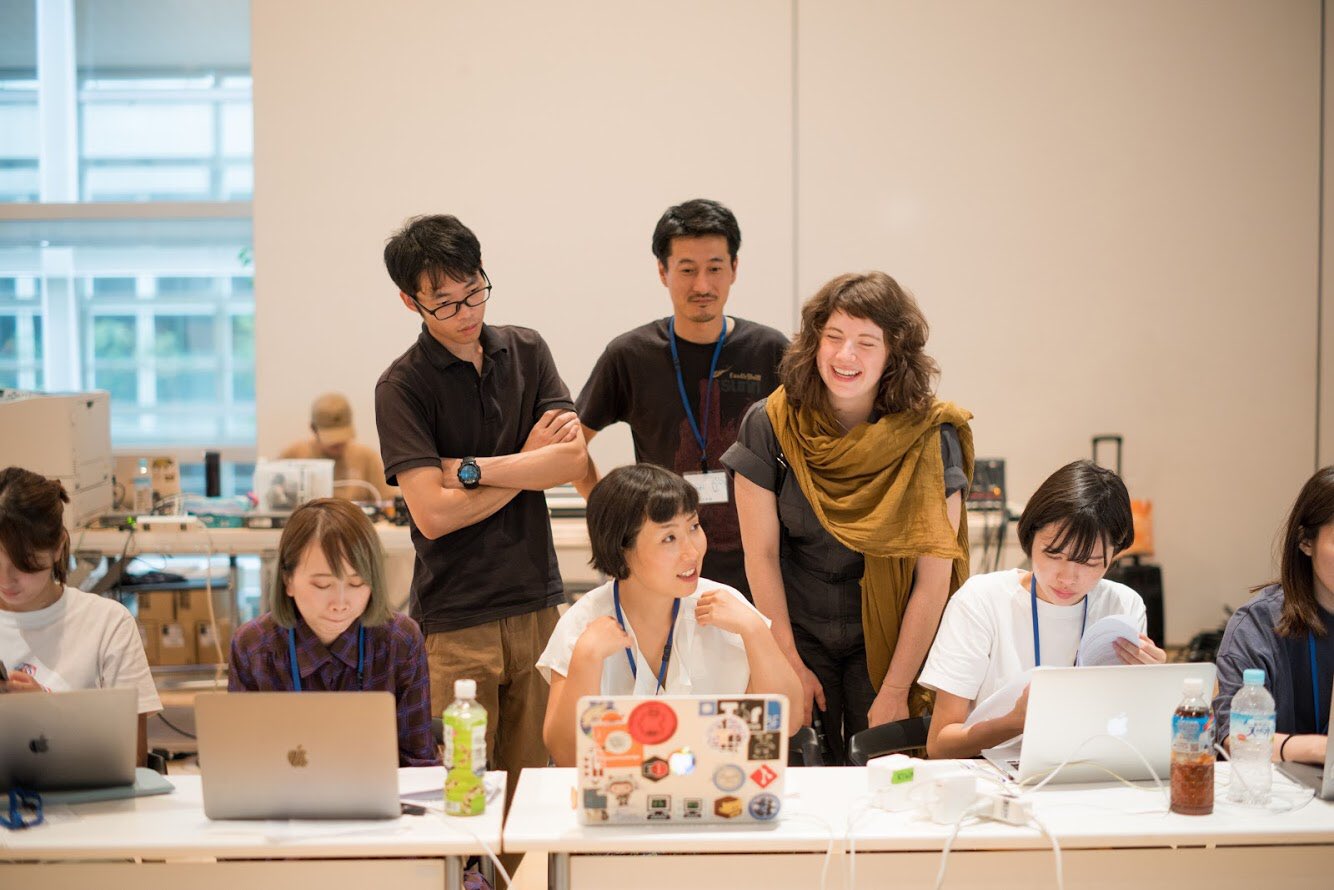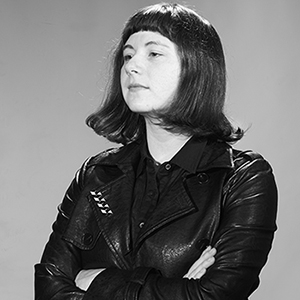
Digital Love Languages: Codes of Affirmation
Date: Starting in June 9th, 2020. Meets Weekly on Tuesdays 1-4 PM EST
Teacher: Melanie Hoff
Application is now open until June 1st, 2020
As our daily activities and closest relationships become increasingly bound up with corporate systems of surveillance and exploitation, let’s explore and cultivate code as a love language that can be gentle, healing, and intimate. How do we want to live in a post COVID-19 world, and what role do we want technology to play? Digital Love Languages: Codes of Affirmation is a class about building poetic tools for online communion through a re-introduction to computers. This class is also a call to action for expanding computation’s capacity for fostering interdependence and emotive expression.
Together we will build small and personal software for affirming one another across physical distance. Technology will be unpacked as a social process, not only a logic or material, regarding code as a craft and medium capable of expressing the full range of feeling and desire.
This course will be in two parts. The first four weeks will be focused on getting comfortable with the building blocks of programming and natural language processing using Python. We will look to the history of the love letter as a form, from the quill to the sext.
The last four weeks will be an investigation of the browser as a fertile site for ambient and playful communication. Through code and the browser we can facilitate the kind of care that happens in the small moments of routine. In this part of the course we will get comfortable with the building blocks of the web and make browser extensions using javascript.
This class owes a great deal to the works of bell hooks, Audre Lorde, Olia Lialina, Cory Arcangel, Lauren McCarthy, and Allison Parrish. This class is also deeply inspired by BUFU & China Residencies where a group discussion in a Cloud9 workshop called Queering Zoom led by Tate Benson inspired the title of this class.
No prior coding experience is necessary, as this class is oriented towards new programmers. We are committed to co-creating with participants an anti-racist, anti-sexist, and environmentally conscious theory of computation. The code of conduct will be co-written by and upheld by all participants. SFPC is a school organized by people who are committed to making space for people who exist at the intersections of oppressed identities, including but not limited to those who are queer, trans, people of color, or disabled. The pedagogy of this class draws on the lead teacher Melanie Hoff’s experience as a programmer, artist, and organizer of Code Societies, a three week intensive event at the School for Poetic Computation. In Code Societies, we engaged with code and the ways code acts on our bodies and networks, equally as subject and as medium. Both Code Societies and Digital Love Languages approach learning a technical thing as inseparable from learning a social history of that thing.
Let’s gather for the creation of placemaking on the internet where sweetness and solidarity are valued and supported.

What will students learn?
- The ability to create a space within ourselves where we become intimate with computers and write poetry with their logic
- Fundamentals of the Python programming language
- Introduction to natural language processing using Python
- Navigating file paths fluently using the terminal, an application that allows you to control your computer with text based commands
- To write code as a love letter
- Building blocks of the web
- Fundamentals of JavaScript
- Coding browser Extensions as poetic ambient communication platforms
Student Testimonials
“Melanie provided a model of pedagogy and care that was rigorous, emotionally present, and generous. I’ve learned so much from her about the ways I want to teach, learn, make art, and show up for others. Thank you for all the work and intention that you put into planning this session. I’m so grateful.” - Anonymous Code Societies Student Feedback
“SFPC Code Societies has helped to reconfigure my approach to learning. Here, admitting that you do not understand, that you are falling short of what you wanted to do and need the support of others, is a magic act of naming in itself. A way of creating the communities of learning and care that you may have been searching for. A way of refusing educational standards that expect us to not ask, not desire, to not honor the needs of our own minds and bodies, to not admit places of confusion or unknowing.” - Amber Officer-Narvasa Code Societies blog post, January 2020
“This is hard to put into words, but I feel like Code Societies taught me that the world is more malleable than I knew? That I have the power to influence (physical and digital) space […] that the possibilities for speculative design and visioning are so much more expansive than I thought. Relational and digital interfaces feel more alive now. […] Code Societies made me realize how much trepidation or doubt I still held about interacting with my computer, with code, with the world? I feel like it returned me to a sense of play that I had been looking for. I feel so much more possibility now in every part of my life. Thank you. “ - Amber Officer-Narvasa Code Societies Student Feedback, January 2020
“I genuinely appreciate the care and attention Melanie gives to us as not only students but people too. It makes me feel better knowing that I have a teacher “on my side” that makes an effort to understand us.” - Yanxin Jiang after Melanie Hoff’s class at NYU IDM transitioned to online this semester in response to COVID-19, March 2020.
Instructor Bio

Melanie Hoff is an artist and educator examining the role technology plays in social organization and the reinforcing of hegemonic structures. Their work uncovers and re-scripts coded conventions of norms, interfaces, and sex, through software, installation, and new choreographies of exchange. They are a co-founder of Soft Surplus, (a collective space for making and learning near each other), the Cybernetics Library (an art and research collective offering resources for study and critique of socio-technological systems). They teach at NYU IDM, RISD, and the School for Poetic Computation, where they organize Code Societies, a learning initiative about the social histories of technology and the expressive capacity of coding with care. They have presented their work internationally in spaces like the Tate Exchange London, the New Museum, the Queens Museum, The Internet Archive, Pioneer Works, and elsewhere.

TA: Max Fowler is an artist and programmer living in Berlin. Their new media work explores the politics of connectivity and queering feed algorithms. They are currently a member of >top lab, and are one of the stewards of Sari-Sari, a community kitchen and art space. They are interested in helping to grow a collaborative network of healing community spaces, and in providing technical support for artists and activists
This class is organized by Taeyoon Choi of the School for Poetic Computation.
How much is tuition?
$1200 USD + Eventbrite Processing Fees. Upon payment, your space in the class will be reserved.
We are completely self-funded, which dramatically limits our ability to offer scholarships. While we price our classes reasonably to offer quality learning experiences, we understand the tuition is beyond the reach of many people. We are sensitive to the rapidly changing economy due to the COVID-19. While we can’t offer scholarships like the past, we hope to support students in need. Our previous students have received support from cultural foundations, schools, current employers, or crowdfunding. We are happy to provide supporting materials as proof of acceptance. Please check out these resources for financial support in response to the COVID19 pandemic.
We are committed to being fully transparent about how we make and spend money. In the spirit of radical openness and generosity, on which the school was founded, we open-source our finances on Github. There, you can read financial reports and download raw statements.
What if I can’t go, can I get a refund?
- Yes, we can give you 100% refund up to 10 days before class starts
- 50% refund after 10 days, until the first day of class
- No refunds can be given after the first day of class
How do I apply?
Application is now open until June 1st, 2020.
We will be accepting up to 15 students on a rolling basis. We will respond to your application within 10 days of submission. Rolling admissions means there are fewer and fewer slots the longer you wait, so if you’re interested in the program get your application in early!
Is this class right for me?
This class is intended for beginners without much experience in coding. If you have experience with coding, we recommend other classes offered at SFPC.
If you have questions about the class, please write dll@sfpc.io and for administrative questions, please write info@sfpc.io.
Application is now open until June 1st, 2020
